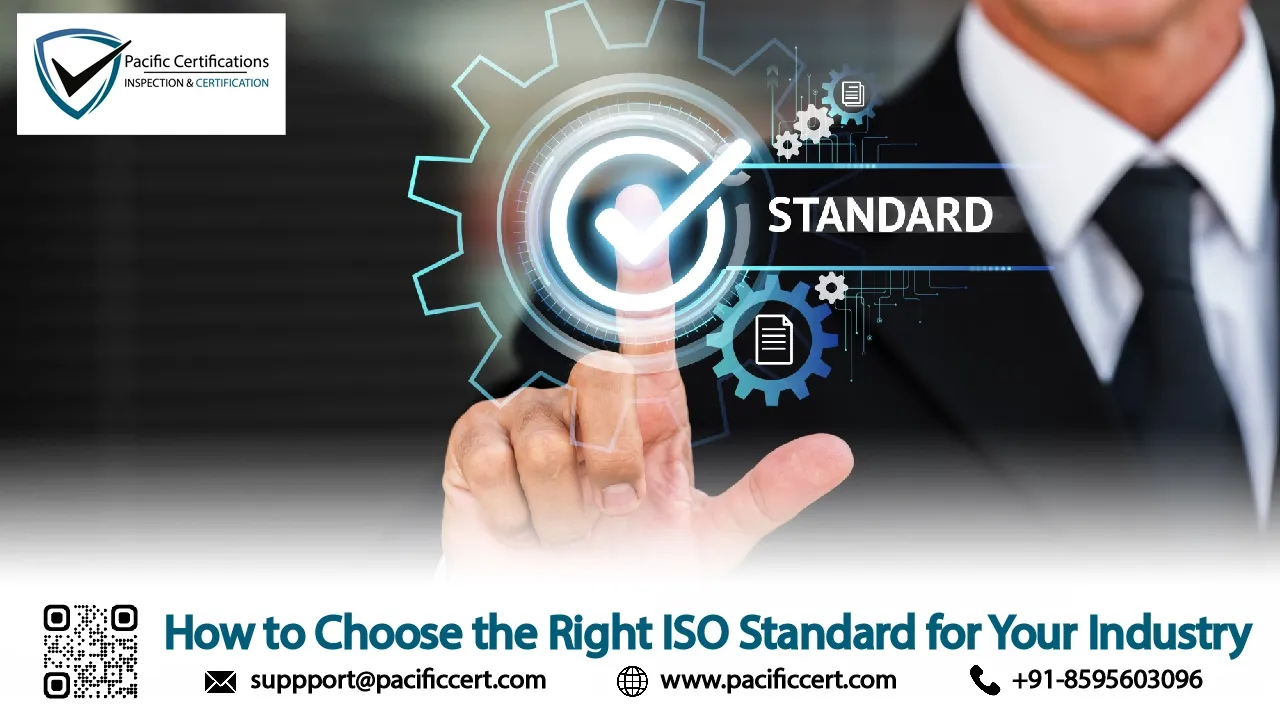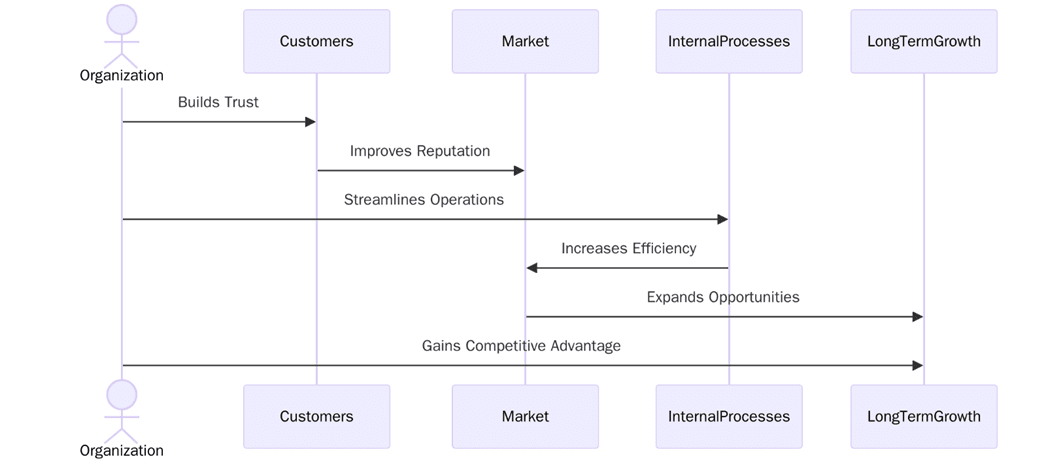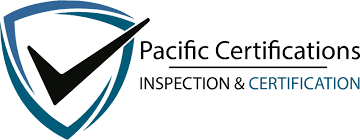How to Choose the Right ISO Standard for Your Industry?

Choosing which ISO standard to follow may be one of the most critical choices an institution makes in their desire to improve quality, safety, security, or sustainability. There are now more than 24,000 ISO standards, each standard is assigned to a distinct area. Institutions can be confused about which certification will provide the most beneficial return on investment. For example, a manufacturer may be focused on product quality and occupational safety, while a data centre may focus on data security, information security and uptimes guarantee. For health care institutions, patient safety and continuity of care are paramount. In the finance industry, standards may focus on data protection and risk management. The decision on which ISO standard to follow needs to be made upon considering the type of services offered, industry compliance and clients' expectations. This makes developing a clear decision-making process for selecting ISO standards important for ensuring long-term confidence and competitiveness.
Speak to an auditor at Pacific Certifications, 15-minute call to scope your certification pathway!
Quick summary
Selecting the right standard of ISO requires understanding the risks, regulatory responsibilities, and expectations of customers in your industry. For instance, when considering standards for manufacturing, ISO 9001 and ISO 45001 may be of most importance among ISO standards.
Introduction
ISO standards exist to develop global frameworks that will allow institutions to deliver on customer expectations while meeting legislation and managing risks. With all the ISO standards developed, it is not unusual for an institution to struggle to identify which standard is applicable. Worse, if an organisation selects the wrong standard it can result in wasted resources. On the positive side, selecting the right standard increases credibility for their organisation while assuring clients of continuous measurable improvement.
A systematic approach is warranted. In selecting an ISO standard, institutions need to consider the relevant risks in their sector, legal requirements and any contract obligations. They should consider long-term client trust for collaboration, as many sectors require recognised certification to work together. When an institution has the right ISO certification, it can enhance the possible growth, resiliency and global consideration in its activities.
Why selecting the right ISO standard matters?
Certification is not just about earning a badge, it represents the institution’s commitment to maintaining reliable systems. Choosing the correct standard ensures that certification efforts address real risks and align with industry needs. For example, a logistics provider without ISO 28000 for supply chain security may face difficulties in winning contracts, while a hospital without ISO 13485 or ISO 9001 may lose credibility in medical device management.
ISO standards by industry - quick reference
This reference helps institutions quickly identify the standards most relevant to their industry, making the certification decision more straightforward.
What are the requirements when selecting the right ISO standard?
The selection process must have certain criteria for institutions to correctly choose the appropriate certifications. These will ensure that any certification selected addresses real needs and can sustain. Below is a list of criteria to consider:

1. Identify industry-specific risks such as data breaches, product failures or issues related to patient safety.
2. Scope the certification concerning services, location, or departmental impact.
3. Scrutinise your regulatory obligations, as well as any specific laws for your sector that require certification.
4. Define who the stakeholders are, be sure to include leadership, customers and regulators.
5. Perform a gap analysis mapping your current practices to relevant ISO standards.
6. Document any priorities such as quality, security, safety and continuity.
7. Provide proof that the standards selected are relevant to institutional imperatives such as SLA monitoring/auditing for compliance.
8. Assess costs and resources needed for training, documentation and audits.
9. Plan for non-duplicated efforts and possibly overlap with existing certifications.
10. Stay committed to continual review as industry risks and regulations change over time.
Certification audit
Certification is verified through a two-stage audit by an accredited body:
Stage 1 audit: Reviews documentation, policies, and risk assessments.
Stage 2 audit: Checks implementation across services, infrastructure and staff responsibilities.
Nonconformities must be addressed before certification is granted.
Management review: It ensures leadership oversight.
Final certification: It is awarded after successful compliance.
Surveillance: Audits take place annually.
Recertification: Audits occur every three years.
What are the benefits of selecting the right ISO standard?
Picking the right ISO standard for your organisation is beneficial beyond simply getting certified - it confirms that your resources were applied to the areas deserving the most attention of your clients and regulators. Your organisation can track other improvements using key performance indicators (KPIs) like service level agreement (SLA) compliance, incident response time and customer satisfaction or the amount of time to close audit findings. The primary benefits include:

• Enhanced credibility with clients and regulators
• Market access through compliance with required buyer and industry requirements
• Reduction of risk through the mitigation of industry specific vulnerabilities
• A more strong governance framework that includes documented systems and accountability
• Improved staff training tied to industry priorities
• Sustainability through measuring outcomes and ongoing improvement.
Recent trends in ISO certification selection
In recent years, organisations are beginning to adopt integrated management systems, unifying multiple ISO standards into one system. For example, cloud providers generally adopt ISO/IEC 27001, ISO 22301 and ISO 20000-1 at the same time. Manufacturers combine ISO 9001, ISO 14001 and ISO 45001. This unification minimises duplication and streamlines audits.
There is also greater emphasis on the utilisation of ISO certifications to complement an organisation’s ESG (environmental, social and governance) commitments or focuses. As ISO 14001 and ISO 50001 gain momentum, institutions check KPIs and documentation for concepts such as downtime rate, service level agreement (SLA) reporting and resolution times % to ensure that certification is not merely cosmetic and actually improving how they function.
Contact us
Pacific Certifications provides accredited ISO certification services tailored to every sector. Our audits help institutions identify the right standards, build resilience, and meet client and regulatory expectations.
Request your ISO audit plan and fee estimate, we will help you map Stage-1/Stage-2 timelines and evidence requirements for your institution. Contact us at [email protected] or visit www.pacificcert.com.
Contact Us
If you need support with ISO certification, contact us at [email protected].
Author: Alina Ansari
Read More at: Blogs by Pacific Certifications

